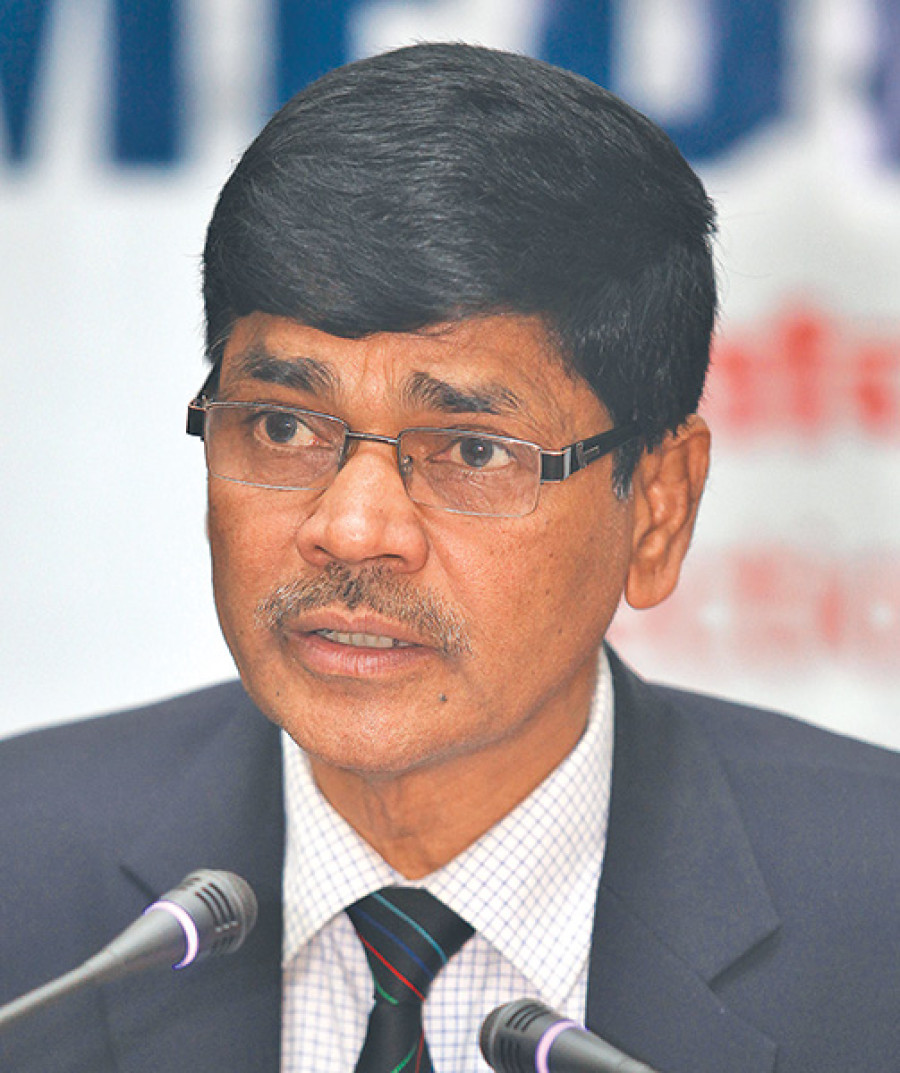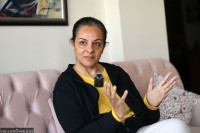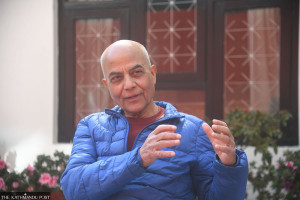Interviews
Nepali voters viewed local elections as historic and hence a high turnout
The Election Commission has received flak for being unable to reprimand political parties for violating the election code of conduct and being biased towards the government,
Kabindra Purush Dhakal
The Election Commission has received flak for being unable to reprimand political parties for violating the election code of conduct and being biased towards the government, while conducting some questionable deals of their own—such as purchasing luxury vehicles for the EC. While he refused to comment on the exorbitant vehicle purchases, EC Chief Ayodhee Prasad Yadav did provide some insight on the successful completion of local level elections when Prithvi Shrestha and Kabindra Purush Dhakal talked with him this past Friday.
There has been a high voter turnout for the three local elections, with the third phase garnering the highest—a 77 percent turnout. What are the factors responsible, and did the RJPN’s participation influence voter turnout?
The local elections have been viewed as a historic event. The high voter turnout shows that the voters have viewed the elections positively as a means to bring about democratic change in Nepal. People have been craving representation.
The parties too have advertised their candidates at the local level like never before.
RJPN only participated in the third phase of polls, in Province 2. We have had two rounds of local elections before that, and both those rounds witnessed a high voter turnout of over 74 percent, so we cannot attribute the high numbers just to the mobilisation of one party.
Phase III of local level elections witnessed violations of the election code of conduct (CoC). For example, there have been complaints that ceiling on spending per candidate has not been adhered to. The EC has asked the political parties why they blatantly violated the CoC, but without any legal measures to bring violators to account. Why?
It is the duty of the EC to hold elections and publish a CoC that will ensure that polls are unbiased. But it is also the duty of the political parties to adhere to the CoC, and the duty of every stakeholder to make sure the political parties adhere to these guidelines.
Violations happened in the first two phases as well. We blocked the use of illegal publicity materials during the recent elections, and sought clarification from the parties why they made use of illegal materials. We have tried minimising such violations as much as possible.
These elections had to happen within a short period of time so that all polls are completed before the constitutionally mandated deadline. These elections are about bringing in a paradigm shift in the political system in Nepal, so conducting them on time was more important than delaying polls over some incidents.
In regards to spending over the ceiling, the EC sent two to three micro-monitors to every election constituency. Their sole task was to monitor the spending of candidates and report back to the EC if there were any violations of spending over the ceiling.
Their reports have shown that there was no major spending over the ceiling. However, we are talking about visible expenditure, and in a country where tax evasion and underhanded spending cannot be controlled, I can only claim that the ceiling has not been crossed as far as the EC’s access to the candidates’ finances shows.
In terms of the spending reports candidates and parties were supposed to submit from the recent elections, while all parties have submitted their spending reports, not all candidates have done so.
The EC has tried to force candidates to release their financial information and spending history through adverts and announcements. However, with preparations for the federal and provincial elections, the EC has been unable to devote time and energy in making sure the candidates submit their reports.
The upcoming elections will feature national leaders contesting for seats, and so the EC will afford greater concern to violations to the CoC. We have decided to be stricter in enforcing the election CoC and monitoring the situation.
What is your take on the perception that the EC has been submissive to the government’s demands on a number of issues, not least concerning the setting of election dates and the expansion of Cabinet after the elections are announced?
All around the world, ECs have to use the support of the government and lawmakers, as they are the primary stakeholders. The security personnel and procurement of resources to be used by the EC comes from the government.
The laws that govern elections and the functioning of the EC come from Parliament. We have to rely on these institutions to function, and perhaps that has led to the misconception that the EC is at the beck and call of the government.
We protested when the government shifted the dates, however, it was necessary for us to work with the government to hold elections successfully. It is the EC’s job to conduct elections.
However, the right to announce the date of elections still lies with the government in Nepal.
In the matter of the Cabinet expansion, we cannot do a whole lot except warn the government against such actions. We issued strong statements against such practises, but we do not have the authority to hold the government to account.
It all comes down to ethics; the government should not have done this, and the people should voice their opinion against expanding the Cabinet and breaching the election CoC.
In a way, we have to take this as an act of a coalition transitional government that has to function till elections and until Nepal has new representation and a new government within a new political system.
The high number of invalid votes (for example Lalitpur recorded 17.1
percent invalid votes) during the local elections were a matter of concern. And now, upcoming polls have two election options on one ballot paper. Could this create further confusion among voters?
The political parties and the EC are working together to conduct voter education programmes. As for the invalid votes in the local elections, voters had to pick seven different options and perhaps this led to confusion.
We constantly try to design ballot papers and educate voters to mitigate the issue of invalid votes.
Another issue is our multiparty electoral system. Any registered party is allowed to field candidates all around Nepal. This means that the ballot papers are bound to be larger to accommodate all party symbols.
There is a need to reform the electoral system. We need to be able to source new technology to counter issues with large ballot papers. For now, in the upcoming polls, it is going to be easier for the voters to cast valid votes because they have to pick one candidate each for federal and provincial representation, unlike the seven they had to pick during local elections. We are in the process of designing the paper to clearly differentiate these two choices.
What were the lessons learnt from the local elections?
The main lesson the EC gleaned from all this is that the people have understood that it is their right and their duty to voice their opinion for representation.
Now, the parties have to understand this lesson too, in the run-up to the provincial and federal elections. The other issue we had was with the number of invalid votes. The only way to address these issues is through reform of the electoral system.
You mention that reforms are needed, yet the EC could not push through changes such as the use of electronic ballot markers, provisions such as the‘right to no vote’, and the setting of dates for elections.
The EC included such important provisions when it drafted the Bill. However, under our parliamentary system, bills travel through multiple desks before it is tabled in Parliament. The EC can only suggest reform provisions; it is ultimately the lawmakers and the government that decide on legislation.
In terms of who gets to decide on setting the dates for elections, we want the fixed dates whether by embedding it into the constitution or through legislation.
That way, the EC has enough time to prepare for the polls, and no government or party can influence the time of elections to suit their needs.
Do you stand by your assertion of not using foreign aid to gather resources for the elections?
It is difficult to reject outside help when it is offered, however, we have to minimise the use of foreign aid. We have used UNDP, Indian and Chinese funding and donated materials for elections in the past.
This time however, we decided to work within the budget the government is providing for the elections. We had requested security seals for ballot boxes, and indelible ink, from China.
However, they told us that they will be unable to provide us with such items atsuch short notice. So, we have decided to procure these items ourselves. The vehicles provided to us by India have already been deployed across all districts, and we do not plan to ask for more.
We are also taking the help of UNDP and International Foundation for Electoral Systems (IFES) for training and voter education. However, we will not take any more goods and items from foreign donors.
EC’s decision to purchase some ‘luxury vehicles’ for the commissioners invited controversy. What is your comment on it?
I don’t want to comment on the issue.




 18.12°C Kathmandu
18.12°C Kathmandu



.jpg&w=200&height=120)








